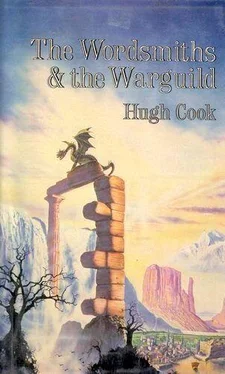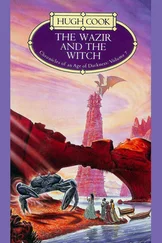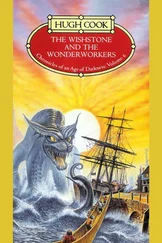Hugh Cook - The Wordsmiths and the Warguild
Здесь есть возможность читать онлайн «Hugh Cook - The Wordsmiths and the Warguild» весь текст электронной книги совершенно бесплатно (целиком полную версию без сокращений). В некоторых случаях можно слушать аудио, скачать через торрент в формате fb2 и присутствует краткое содержание. Жанр: Фэнтези, на английском языке. Описание произведения, (предисловие) а так же отзывы посетителей доступны на портале библиотеки ЛибКат.
- Название:The Wordsmiths and the Warguild
- Автор:
- Жанр:
- Год:неизвестен
- ISBN:нет данных
- Рейтинг книги:4 / 5. Голосов: 1
-
Избранное:Добавить в избранное
- Отзывы:
-
Ваша оценка:
- 80
- 1
- 2
- 3
- 4
- 5
The Wordsmiths and the Warguild: краткое содержание, описание и аннотация
Предлагаем к чтению аннотацию, описание, краткое содержание или предисловие (зависит от того, что написал сам автор книги «The Wordsmiths and the Warguild»). Если вы не нашли необходимую информацию о книге — напишите в комментариях, мы постараемся отыскать её.
The Wordsmiths and the Warguild — читать онлайн бесплатно полную книгу (весь текст) целиком
Ниже представлен текст книги, разбитый по страницам. Система сохранения места последней прочитанной страницы, позволяет с удобством читать онлайн бесплатно книгу «The Wordsmiths and the Warguild», без необходимости каждый раз заново искать на чём Вы остановились. Поставьте закладку, и сможете в любой момент перейти на страницу, на которой закончили чтение.
Интервал:
Закладка:
Then the sickle trees began to give way to some kind of vegetation he was unfamiliar with: tall, thick, scabrous grey trees set far apart, their foliage so dense that virtually nothing grew beneath them. These trees were covered with long, cruel, jagged hooks, barbs, spikes and claws; their leaves, when Togura was incautious enough to touch a few, snagged at him with myriads of tiny teeth. He decided they deserved the name claw trees.
Realising he was in a very strange neck of the woods, Togura stopped, and went no further. He decided it was time to orientate himself. He looked around for a landmark, but the thick-foliaged claw trees and the high, spindly sickle trees cut him down to hundred-pace horizons in all directions.
He could see bits and pieces of the sky, which was now a diffuse, misty grey; the good weather which had graced the start of the day had failed him. He could not climb the claw trees because they would cut him to pieces; the sickle trees, while harmless, would never support his weight. Without landmarks or sun-light, he could not judge his location or the time of day.
He sat down to think things through, and stood up immediately. The dead dried leaves of the claw trees, which littered the ground underfoot, retained their teeth even after they had littered down from their parental branches. Leaning against a couple of convenient sickle trees, Togura took stock of his situation.
He was lost.
He was tired.
He was hungry.
His clothes were damp and caked with mud.
He had no food, excepting half a dozen persistent leeches, which did not really count.
He had one sword, which by rights should now be cleaned, but which was not going to be because he couldn't be fagged.
He had no water.
He had a painful sword-cut on his nose; though only a tiny little piece of his nose appeared to be actually missing, this was no calculated to improve his beauty.
He had a more serious wound to his calf, which was not disabling – no tendons had been severed, and he did not think it was deep – but which was filthy with muck and mud and was now throbbing painfully.
The day was not getting any younger.
So what should he do?
He first tried to retrace his steps, but found himself rapidly getting lost amidst a featureless expanse of sickle trees. He managed to get back to the claw tree forest, then reconsidered his position. Whatever the dangers, he had no doubt that a return to Keep was his best option. But his chances of getting anywhere by blundering about the wilderness at random were slim.
The ground on which the claw tree forest grew appeared to be sloping steadily uphill. He decided to follow the rising incline, hoping to come to a prominence which would give him an all-round view, or, failing that, at least a prehensible tree capable of supporting his weight.
Togura set off, walking slowly, for he was weary; he limped, as his wounded leg was very sore. Remembering Cromarty floundering in the swamp-trap, he managed a slight smile. All in all, he could be proud of himself. He had kept his head in a burning building. He had matched Cromarty, blade against blade. Riding out of Keep, he should by rights have been able to shake off the pursuit; it was just bad luck that the enemy had managed to follow him through the streets and out of the town. Even then, hunted and outnumbered, he had scored a resounding success with his minor tactics. But that didn't alter the fact that he was lost.
Gradually, his little glow of self-satisfaction faded; he plodded onward, getting slower and slower. The day aged; the light faded; a little rain began to drizzle down through the trees. Eventually, he realised it was evening, and would soon be night.
The smart thing to do now would be to climb a tree, to be safe from wolves. Or find a cave, and barricade it. Or at least cut branches to make a lean-to shelter in which he could bivouac. Then eat, scavenging worms, snails, slugs and fungus.
A country boy born and bred, he knew what he had to do. But the landscape was singularly unhelpful. He was surrounded by unclimbable claw trees; there was now no undergrowth at all, the ground below the trees being littered with sharp-toothed leaves; there were no helpful rocks or hollows; to the best of his recollection, he had not seen or heard any bird or insect since entering the claw tree forest, nor had he sighted any fungus, edible or otherwise.
He was in a cold, dead, evil place, barren of life and bare of water; the rain sifting down through the creaking, rheumatic branches was strong enough to chill and damp him, yet insufficient to give him any hope of assuaging his thirst; a cold wind soughed through the leaves overhead, promising a bitter night.
Togura came to a decision.
What he had was nothing, but it was all he was going to get, so he had better make the most of it. Drawing his sword, he scraped away the leaves, clearing a space where he could lay his body down. Then it occurred to him that he could dig a shallow grave in which he could lie down out of the wind. Better still, he could dig a foxhole in which he could sleep with his knees drawn up to his chest to conserve warmth.
Eagerly, Togura set to work, but found the ground hard and unyielding, seamed and knotted with tangles of tough, fibrous roots. It was hopeless.
He ended up spending the night huddled on the bare ground, sleeping in snatches; whenever he fell asleep, he soon shivered himself awake again. By the time morning came, as unfriendly as a hangover, he was feverish. His wounded leg was almost too painful for him to walk on. The lymph node in his groin was swollen, hard and painful; he suspected that if he had been able to clean his wound and examine it, whe would have discovered an angry red line running up his leg, denoting blood poisoning.
He had no food: even the last of his leeches had left him.
"On your feet, Togura Poulaan," he said.
Rising, he sought for support, and tried to take hold of the branch of a claw tree. A mistake – and one that he immediately regretted.
Chapter 12
"Zaan," said the sun.
The ice-white light ran through his blood in splinters.
It was fading.
"Clouds," he said.
A frog answered him. He spoke. It answered again. His teeth hurt. Then came the rain, drenching away the last of the sunlight. The skirling wind fladdered and scooped, outpacing his eyesight; it came in rents and buffets, sending the shimmy-shimmy leaves stappering and plattering from down to around. Some dead at his feet. He kicked them from ventral to dorsal.
"Tog," he said.
Asking for someone.
He couldn't remember who.
His legs went balder-shalder -tok through rain perhaps autumn or winter. His third leg was a gnarled unyielding strake padded with moss and wort where it jammed home to his armpit. The music of a flute cut closer than a knife; hard, high, unyielding, it lacerated his heart. He felt his pulse-beats bleeding through his body. The wind blew furance hot; he shivered, his teeth tok-tok chin-cha-chattering.
"Hello," he said.
A frog answered.
"Go away, frog."
And then again, hoping against hallucination:
"Hello?"
They didn't seem to notice him. Instead, they kept to their dance, tracing formalities between the green of green boughs and the red of red blood. He waved in their direction with what had once been a hand but which was now a club, a poisoned mass of striving darkness. The ground was rhythmic underfoot. A swathe of wind took him from behind and flattened him to an undug grave.
"Once I had a sword," he said, or thought he said. "But I lost it. Perhaps."
She answered him in the cadence of birdsong, feeding him something which was honey and yet not honey.
"That is good," he said.
"Sleep," she said, or thought she said.
Читать дальшеИнтервал:
Закладка:
Похожие книги на «The Wordsmiths and the Warguild»
Представляем Вашему вниманию похожие книги на «The Wordsmiths and the Warguild» списком для выбора. Мы отобрали схожую по названию и смыслу литературу в надежде предоставить читателям больше вариантов отыскать новые, интересные, ещё непрочитанные произведения.
Обсуждение, отзывы о книге «The Wordsmiths and the Warguild» и просто собственные мнения читателей. Оставьте ваши комментарии, напишите, что Вы думаете о произведении, его смысле или главных героях. Укажите что конкретно понравилось, а что нет, и почему Вы так считаете.












